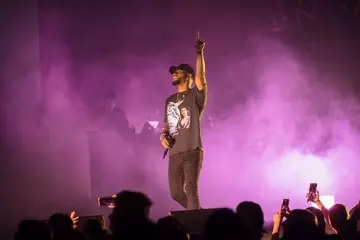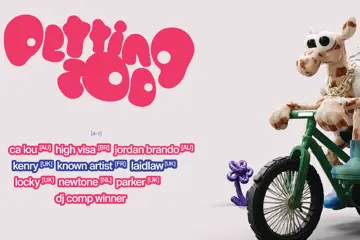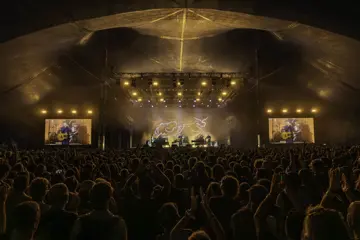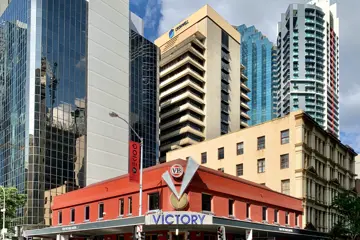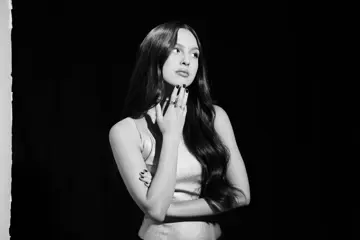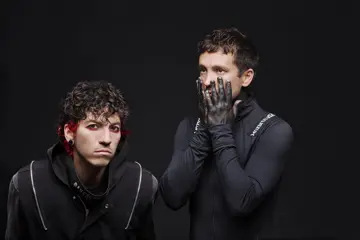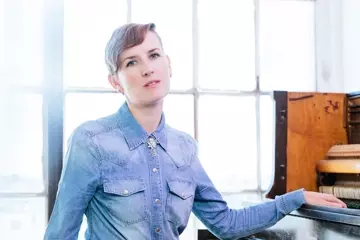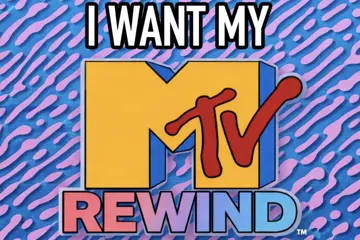"No stress" are the first words we hear from Trevor Noah, and he's sounds surprisingly convincing uttering them.
That's not to suggest that the South African stand-up comedian and host of The Daily Show (he replaced previous host Jon Stewart last September after joining the program as a correspondent in 2014) should be stressed personally.
However, given that not just America but the world seems to be reaching new flashpoints on a regular basis, and that it's part of The Daily Show's — and by extension, Noah's — job to help defuse the most incendiary of current affairs with a few well timed gags and well lobbed truth bombs, one could easily assume that Noah might be feeling a bit of pressure.
Nope. No stress. Noah is even-tempered, good-humoured, affable to the point of professional and polished. Maybe it's because we're talking more about his first love, stand-up comedy, than his Daily Show day job (which he also loves, by the way).
Noah is bringing his stand-up act to Australia in August, performing shows in Brisbane, Perth, Sydney and Melbourne. It'll be his "third or fourth" visit to Australia, a location he regards as "genuinely electric" when it comes to comedy punters.
Don't miss a beat with our FREE daily newsletter
"Australian audiences have this unhindered joy — they're not afraid to enjoy themselves — but they also have a real appreciation for material that is dry or even scathing," he says.
But it's not only Australian audiences Noah holds in high regard, it's Australian comedians. After all, a couple of them helped him muster up the courage and drive to take his act beyond the borders of South Africa (where, admittedly, he was one of the nation's most popular and high profile comedians) and take a shot at the world stage.
"I got to do a lot of shows in a short space of time in South Africa, and I got to work with some really great comedians," he says.
"One of those comedians, who became a friend and mentor to me, was from Australia — it was Kitty Flanagan. She was one of the first people who said to me 'You should come to Australia; you should perform in other countries.' She was in the UK at the time and said I should do my act there, which was something I'd never thought of doing before. But once I did I never looked back.
"Carl Barron said the same thing — we were doing shows together in South Africa and he said I should come perform in Australia. So over time I came to realise that even if I didn't believe in myself at the time, there were other comedians who did. That's how I started touring the world doing stand-up."
Even before landing The Daily Show hosting gig in 2015, which skyrocketed his profile, Noah was already becoming well known for his comedic prowess; his understated, stealthy style, which humorously and intelligently tackled the everyday, the absurd and the provocative, won him fans worldwide.
Noah himself views stand-up as an intimate exchange between himself and the audience, and he feels that relationship hasn't really changed, even if the crowd numbers have risen somewhat.
"It still feels exactly the same," he says. "There's a strange connection that takes place automatically between you and the people, and luckily that's something that doesn't go away when you're doing a stand-up show, regardless of how big your audience has become.
"The stage provides me with a space where I can communicate with people more intimately; I can communicate with people I've built a relationship with over time. So that's why I love getting out and getting on stage — it's a totally different experience [from The Daily Show] when I get to explore a different side of my comedy."
The mechanics of Noah's style as a stand-up have links to his youthful training as a boxer, he says.
"Boxing influenced my comedy in terms of my mentality and the way I tackle things. With boxing, you learn to be calm, you approach situations holistically and you prepare yourself for your purpose. And that extends to my comedy as well — I come in to a venue thinking 'What am I trying to do? How am I trying to do it?' and I then try to stick to that as I do my performance."
But while a boxer's aim may be to knock out their opponent, Noah has something a little more inclusive in mind.
"What makes comedy such a fantastic tool is the ability it has to connect people," he says. "That's what I've always seen it as. It's a beautiful platform for sharing with people and making people feel good. I've had people come up to me after shows and talk about how they were suffering from sadness or having a tough time with their family and how comedy made them feel better."
And re-engaging with live audiences, adjusting the tenor of a set by gauging the mood of a crowd or drawing energy from their approval, is something Noah looks forward to doing when he's away from the The Daily Show desk.
"It can be very difficult with television because you don't have that direct connection with the audience," he says.
"The challenge for me is figuring out how to calibrate my energy so it comes across on screen. But I've never struggled with that on stage because I can feel whether or not the people are connecting with me. When you're doing a TV show you have to recreate that magic without feeling their presence right there with you, so that's what I've been working on it. It's actually something I really enjoy."
He does admit, though, that clips of The Daily Show segments going viral via social media almost immediately provides a similar sort of feedback.
"How we receive and share information has changed so completely, and in ways good and bad," he says. "Social media is an incredible tool for disseminating information — just look at the overthrowing of the Egyptian government, where it played a big part. But we're also obsessed with the hot take, aren't we? We're all trying to be the first person to get anything out there. I don't think before Twitter people were in quite such a hurry to share their condolences about the death of a celebrity."

